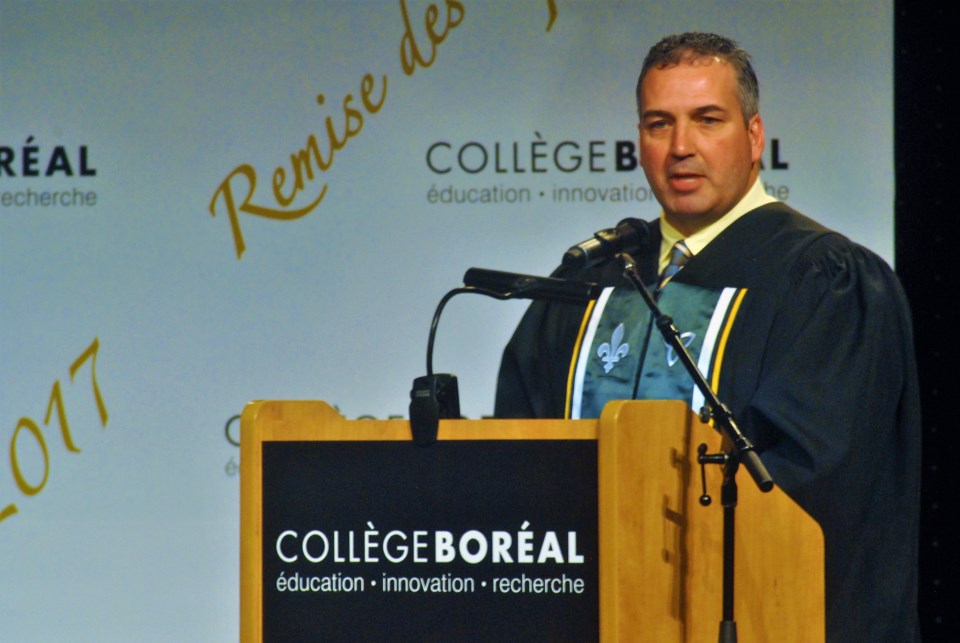Although well short of the $2-plus billion recommended by an expert panel, provincial funding of $1.3 billion announced this week for Ontario’s struggling post-secondary sector is an “important first step,” said the president of Collège Boréal.
“I think most of us were hoping the recommendations of the blue ribbon panel would be followed,” said Daniel Giroux. “But I think, you know, the good news is it’s an important first step, especially when you’re looking at operating grants.”
The blue ribbon panel Giroux was referring to was created by the province in response to the 2021-22 insolvency at Sudbury’s own Laurentian University, and examined the financial sustainability of Ontario’s post-secondary sector.
Among other measures, the panel recommended a one-time tuition fee increase of five per cent effective next September, followed by tuition fee increases of two per cent or the rate of inflation, whichever is greater.
However, the government plans to maintain its years-long tuition freeze for in-province students introduced in 2019 after a 10-per-cent cut.
It will let schools raise fees for non-Ontario Canadian students by five per cent per year for the next three years.

Giroux said the continued tuition freeze is a “little disappointing,” and “we would have liked to see that unfrozen.”
He said he was glad to see in the announcement $10 million in additional one-time funding through the Small, Northern and Rural Grant for colleges and Northern Ontario Grant for Universities in 2024-25.
While there are no specifics, “anytime we get a little bit of help, it's definitely good news,” Giroux said.
The provincial government announced its funding package in the wake of the federal government’s decision to limit the amount of international students coming into Canada.
These students have been seen as a source of ready cash for colleges and universities, as their tuition was not subject to the fee freeze.
It’s a situation that interim Laurentian University president Sheila Embleton said, along with the funding woes, has pushed the entire post-secondary sector into “turmoil.”
The province didn’t provide any answers on the international student situation in its announcement this week, saying only “the province is working closely with the post-secondary sector to achieve a fair allocation of the available study permits.”
In terms of the international student situation, Giroux said “like any other institution, we’re going to be impacted.”
He said in Sudbury, Boréal has 1,200 students in total, and around half are international students.
Information previously provided by the college said the school has 2,100 students at its campuses across the province, and 47 per cent are international students. The proportion of international students also sits at 47 per cent at its Sudbury campus.
The international student population at Laurentian University, and, especially, Cambrian College, is much higher.
Prior to the international student announcement in January, the federal government announced it wants to increase francophone immigration, something Boréal’s programming plays into, Giroux said.
He’s hoping this goal is taken into account in allocating international student spaces to the Francophone college.
The $1.3-billion funding package — to be doled out over three years, starting next year — is split into several parts.
Just over $700 million will be distributed to all of Ontario's 24 public colleges and 23 universities, with an additional $200 million going to those with the greatest need, and, as stated above, an extra $10 million top-up for northern and rural schools.
The province will consider factors like geography, total enrolment, and reliance on international students for extra funding.
The province is also spending nearly $170 million to help schools with capital repairs and equipment costs, plus $100 million for STEM programs, over $65 million for "research and innovation," and $23 million for additional mental health support.
Post-secondary schools are also getting $15 million for third-party audits to help "identify operational and financial efficiencies," according to the press release.
The bill Dunlop introduced on Monday allows her to direct schools to give students more information on "ancillary fees" — like textbook costs — "in a consistent manner (like) publishing costs in a course syllabus."
Sudbury.com also reached out to the other two Sudbury post-secondary institutions, Laurentian University and Cambrian College, for comment on this week’s post-secondary funding package.
A spokesperson for Cambrian College said the college’s president, Kristine Morrissey, was not available for an interview this week, as not enough specific information about what this would mean for the local college is currently available.
Laurentian University interim president Sheila Embleton was also not made available for an interview, although a written statement attributed to her was sent by email.
"We look forward to learning more about the details of the funds referred to in the announcement, specifically for northern institutions, to learn the breakdown of the $10 million identified for the region's institutions,” said the statement from Embleton.
“The announced funding will provide interim financial relief as we work with the government on a longer-term financial sustainability package for the post-secondary sector.
“In addition, we look forward to hearing soon about the government’s plans with respect to the international student visa cap affecting undergraduate students, as this information is crucial to finalizing our budget plan for the upcoming 2024-2025 fiscal year."
-With files from Aidan Chamandy of The Trillium and Canadian Press



